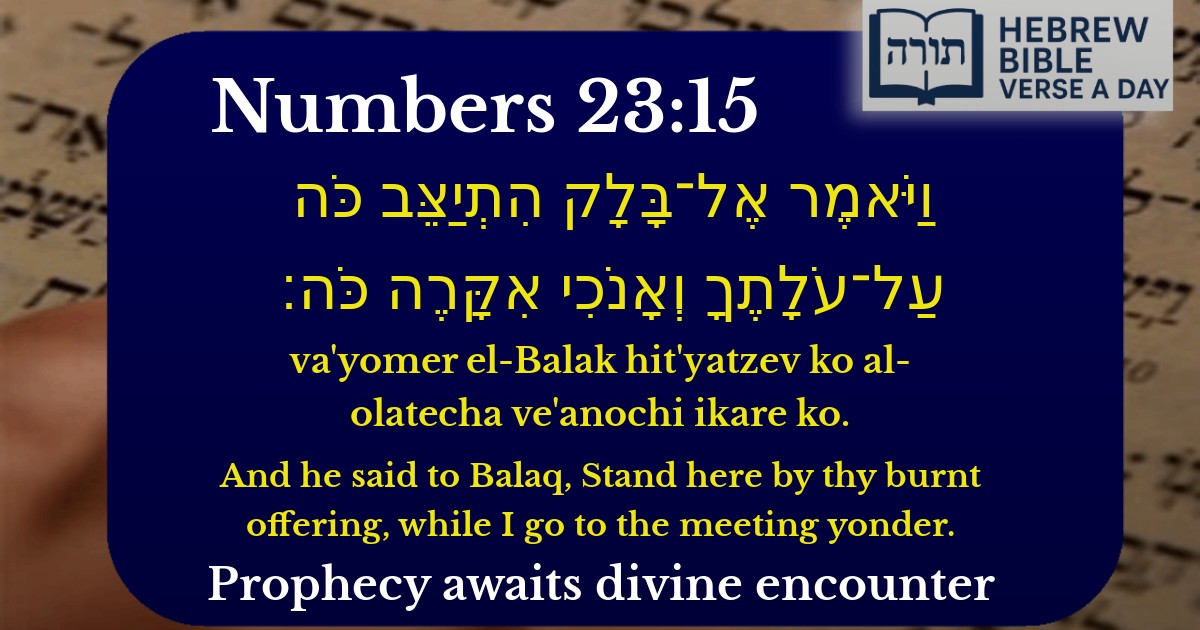Frequently Asked Questions
Q: What does 'I will go to the meeting yonder' mean in Numbers 23:15?
A: According to Rashi, this phrase means that Balaam (the speaker) was distancing himself to seek divine inspiration or prophecy. The word 'כֹּה' (koh) implies a temporary departure to a place where he could receive communication from Hashem, as prophets often needed solitude for divine revelation.
Q: Why did Balaam tell Balak to stand by his burnt offering in this verse?
A: The Midrash explains that Balaam instructed Balak to remain by his sacrifice to show his sincerity and readiness to receive a divine response. In Jewish tradition, sacrifices were a means of drawing closer to Hashem, and Balak's presence demonstrated his commitment to the process, even though his intentions were misguided.
Q: What lesson can we learn from Numbers 23:15 about prayer or divine communication?
A: The Talmud (Berachot 32b) teaches that proper prayer requires focus and preparation, much like Balaam separating himself to seek divine communication. While Balaam was not a righteous prophet, this verse highlights the principle that connecting with Hashem often requires intentionality and removing distractions.
Q: How does this verse relate to the broader story of Balaam and Balak?
A: As Ramban explains, this verse is part of the sequence where Balak tries to get Balaam to curse the Israelites. Despite Balak's persistence, Hashem controls Balaam's words, turning intended curses into blessings. This shows that no human can override divine will, a key theme in the Torah's narrative.
Q: Why does the Torah use the word 'כֹּה' (koh) twice in this verse?
A: Rashi notes that the repetition of 'כֹּה' (meaning 'here' or 'thus') emphasizes the separation between Balaam's role as the one seeking prophecy and Balak's role as the one awaiting the outcome. This linguistic detail reinforces that true divine communication cannot be manipulated for personal agendas.


Context of the Verse
The verse (Bamidbar 23:15) occurs during the episode where Balak, king of Moab, hires Balaam to curse the Israelites. Balaam instructs Balak to stand by his burnt offering while he seeks divine communication. This interaction highlights the tension between Balaam's prophetic role and Balak's malicious intent.
Rashi's Explanation
Rashi (Rabbi Shlomo Yitzchaki) comments on the phrase "הִתְיַצֵּב כֹּה עַל־עֹלָתֶךָ" ("Stand here by thy burnt offering"): Balaam tells Balak to remain steadfast in his place, implying that Balak's presence and offerings alone are insufficient to guarantee divine response. Rashi emphasizes that true prophecy depends on divine will, not human manipulation.
Rambam's Perspective
Rambam (Maimonides) in Moreh Nevuchim (Guide for the Perplexed) discusses Balaam's unique prophetic status. Unlike other prophets who received divine messages passively, Balaam actively sought prophecy ("אִקָּרֶה כֹּה"—"I will go to the meeting"). Rambam notes that this reflects Balaam's flawed character, as he attempted to use prophecy for personal gain rather than divine service.
Midrashic Insights
Symbolism of the Burnt Offering
The burnt offering ("עֹלָה") symbolizes complete devotion, as it is entirely consumed on the altar. However, the Talmud (Sanhedrin 105b) notes that Balak's offerings were insincere, meant only to manipulate divine favor. This contrasts with the Israelites' offerings, which were accepted due to their genuine commitment to Hashem.
Practical Lesson
This verse teaches that true divine connection cannot be manufactured through external rituals alone. As the Sforno explains, Balaam's words reveal that even a prophet must humbly await divine communication rather than assume control over it. This aligns with the broader Jewish value of עֲבוֹדַת ה' בְּתָּמִים (serving Hashem with sincerity).